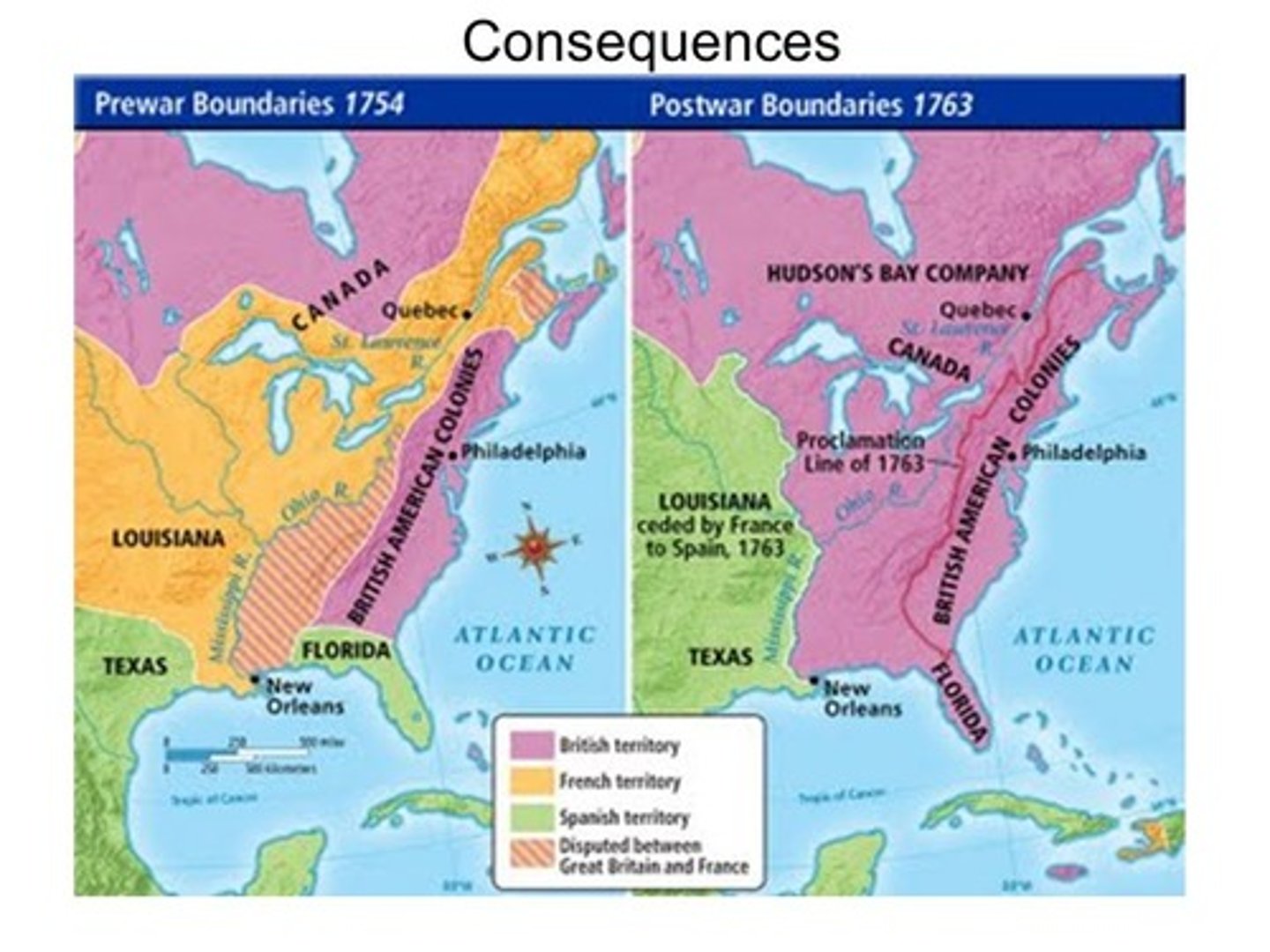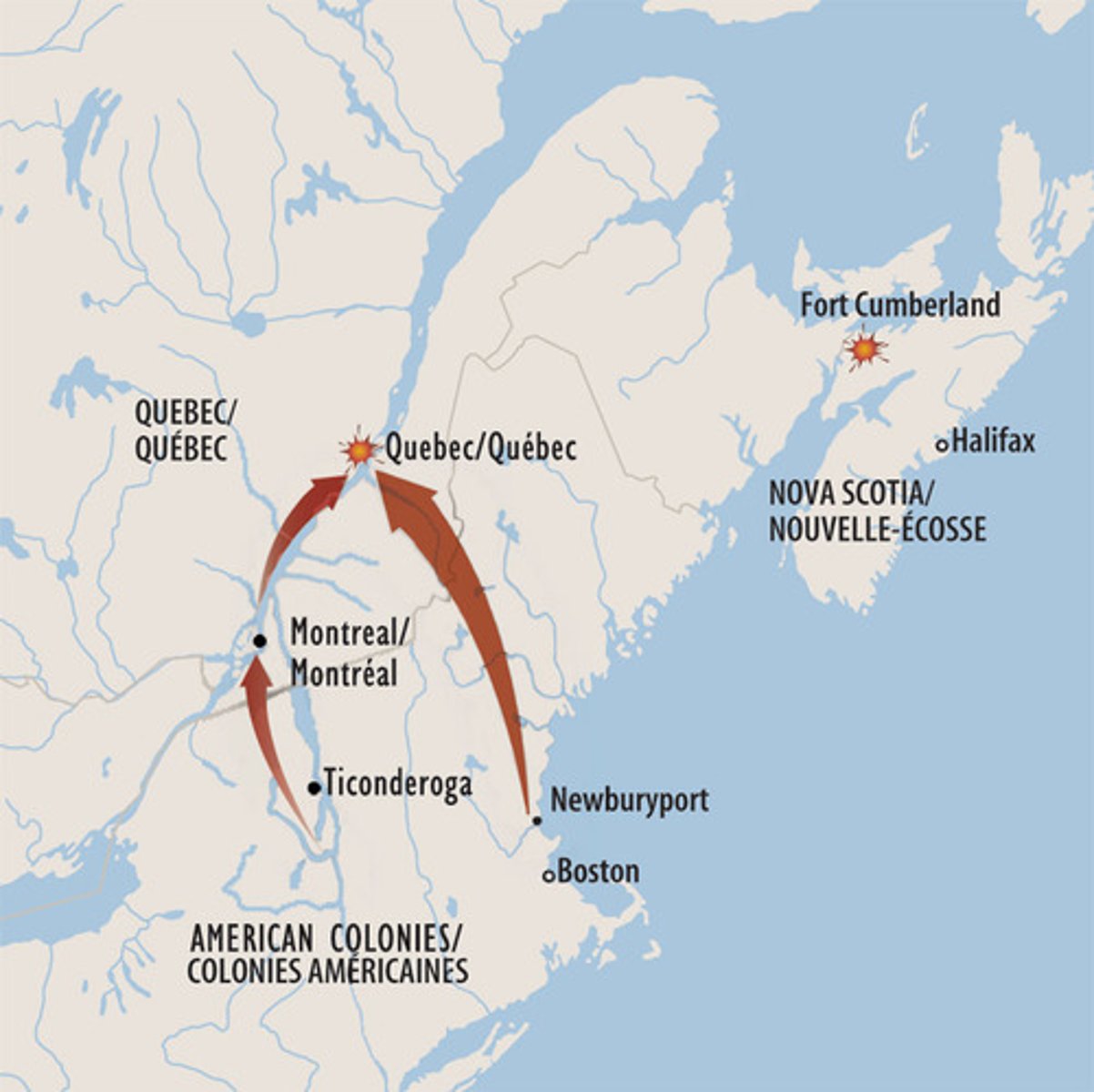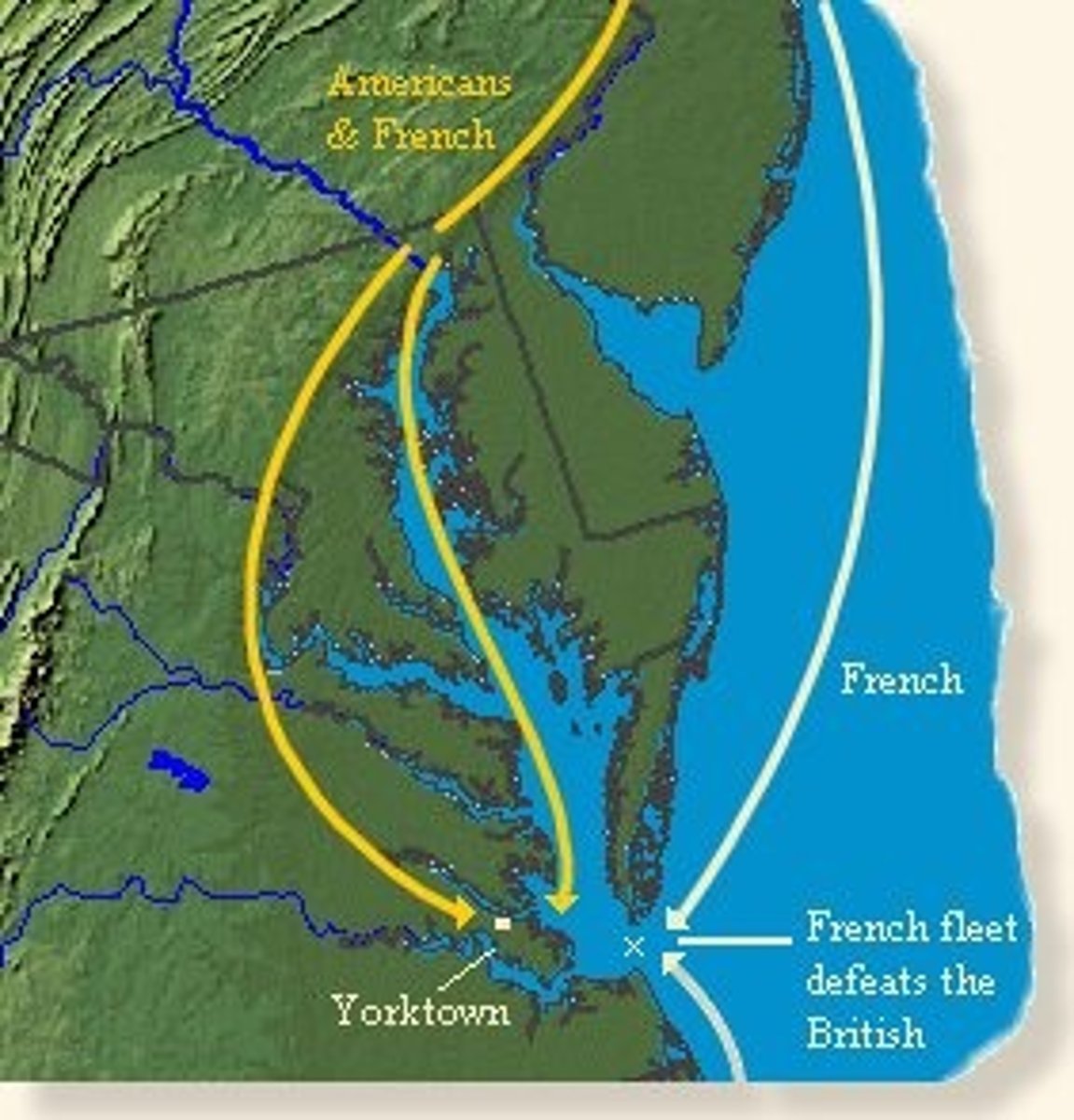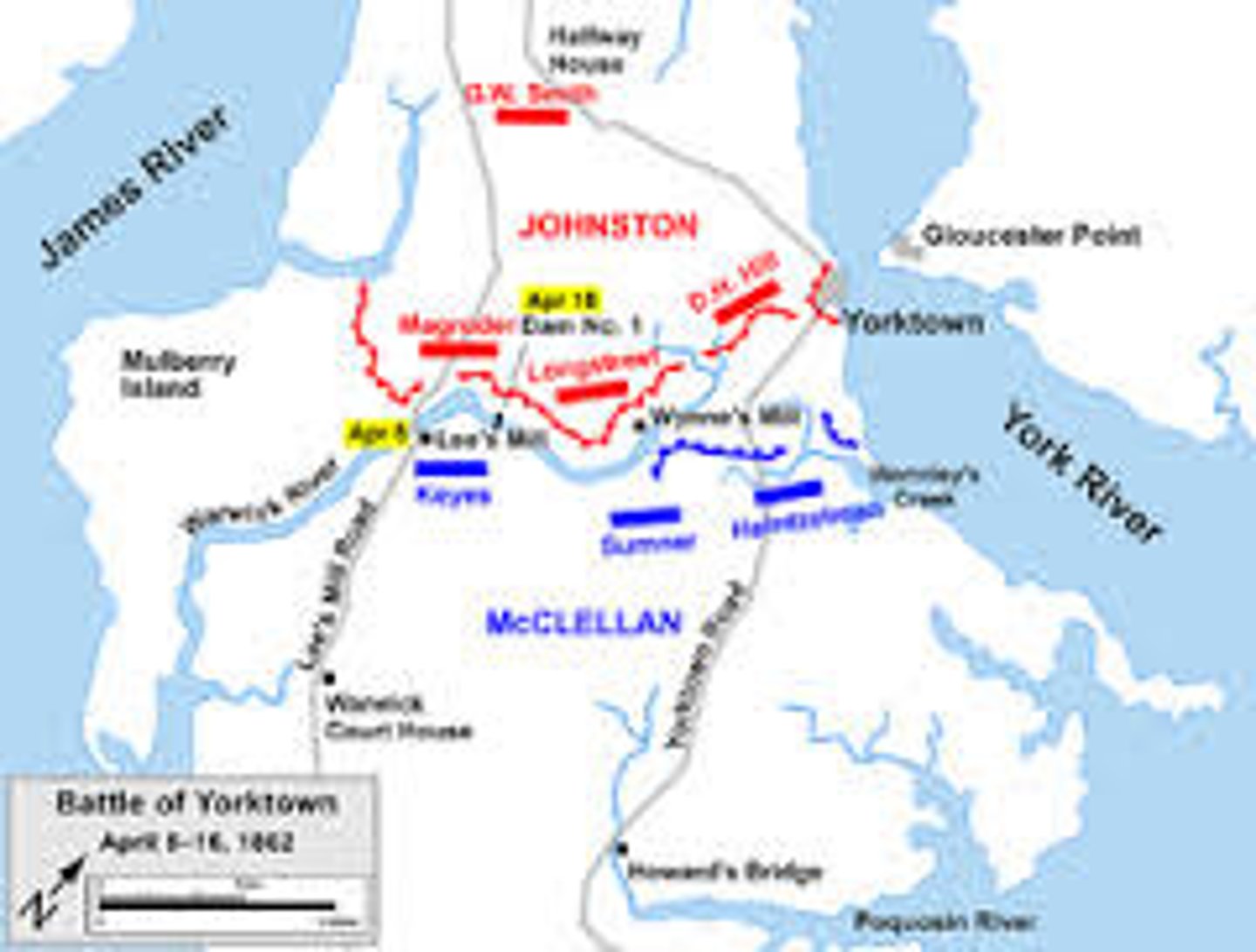A-Level History - America 1740-96 - Battles
1/26
There's no tags or description
Looks like no tags are added yet.
Name | Mastery | Learn | Test | Matching | Spaced |
|---|
No study sessions yet.
27 Terms
Pontiac War
1763 to 1766
- Odawa tribe leader Chief Pontiac lead a group of natives against the colonists in an attempt to expel them from the land
- Brutal warfare, some British attacks included throwing smallpox infested blankets into native camps
- Renewed racial violence
Cherokee War
1758 to 1761
- Between the British and Cherokee tribe following a breakdown of their alliance
- Natives treated brutally, including scalping, restricting supplies, and massacres- Burnt down extensive amounts of Cherokee settlements that were never able to be reoccupied
Lord Dunmore's War
1774
- Between the Virginian colony and the Shawnee and Mingo tribes over treaty violations by the white settlers
- Warfare resulted in the destruction of several native villages, only ending when they agreed to give up more land to the colonists
War of Austrian Succession (King George's War)
1740 to 1748
- British victory
- War in Europe spread to America due to French hostility, worsened by religious conflict
- French had more alliances with the natives
- Major colonial victory in the capture of Louisburg
- Ended with the treaty of Aix-La-Chapelle in 1748, giving Louisburg back to France
Seven Years War (French-Indian War)
1756 to 1763
- Major British success
- By 1758, the British had recaptured Louisbourg and Fort Duquesne (renamed Fort Pitt)
- Cooperation between Britain and the colonies
- War ended with the Treaty of Paris in 1763

Battles of Lexington and Concord
19th April 1775
- American victory
- Paul Revere's night riders rode through the Area warning against the incoming British and mobilising the local militia
- 273 British dead, compared to 92 Americans
- British political disaster, but inspired Patriot support
Battle of Bunker Hill
17th June 1775
- British success, but had over double the casualties of the Americans
- Bloodiest engagement of the war (1/8 of all British casualties)
- Brought British attention to the severity of revolutionary thought in America
Invasion of Canada
1775 to 1776
- Eventual British success, despite early American victories
- General Montgomery captures Montreal in Nov 1775, and Arnold captured Quebec in Dec
- Eventually forced to abandon them due to British deployment of troops and poor weather

Lord Dunmore's Attack in the South
1776
- British disaster
- Dunmore and 500 loyalists launched raids on Virginian coastal towns
- Solidified revolutionary support in Virginia as he declared he would grant freedom to any slaves fleeing rebel masters
- Carolinian loyalists were defeated at Moore's Creek in February 1776
British Evacuation of Boston
March 1776
- 4th - 17,000 rebels captured Dorchester Heights overlooking Boston
- Increased American presence put pressure on the British, forcing them to evacuate on the 17th to Nova Scotia
Battle of Long Island (Brooklyn Heights)
27th August 1776
Howe / Washington
- British victory, gained access to the Port of New York which they held for the rest of the war
- 2,000 American casualties
Landing at Kips Bay
15th September 1776
Clinton / Washington
- British victory, greater advantage in the sea
- Captured 320 Americans
Battle of Harlem Heights
16th September 1776
Leslie, Howe / Washington
- Inconclusive, Americans driven further north
Battle of Trenton
26th December 1776
Raul / Washington
- American victory, cut off Hessian troops retreat to force surrender
- Surprise attack
- Americans captured 900 Hessians
Battle of Princeton
3rd January 1777
Cornwallis / Washington
- American victory in spite of early British successes via a counter attack
- Allowed for congress to return to Philadelphia
Siege of Fort Ticonderoga
2nd - 6th July 1777
Burgoyne / St Clair
- Key fort on the Hudson, NY
- British victory
- American soldiers left to contest the victory found drunk
- Another embarrassing defeat, St Clair never given leadership again
Battle of Staten Island
22nd August 1777
Campbell / Sullivan
- British victory, but unimportant tactically
- Americans able to capture 80 POWs and destroyed supplies, but British captured 200
Battle of Brandywine (Brandywine Creek)
11th September 1777
Howe, Cornwallis / Washington, Lafayette
- British advantage forced Washington to abandon post and march north
- Over 30,000 troops combined - largest battle of the war
- Fighting lasted over 11 hours
Battles of Saratoga - First Saratoga (Battle of Freeman's Farm)
19th September 1777
Fraser (killed) / Gates, Arnold
- British victory, pushing the Americans back
- Suffered double the casualties
Battles of Saratoga - Second Saratoga (Battles of Bermis Heights)
7th October 1777
Burgoyne / Gates, Arnold
- American victory, marked a major turning point in the war
- Burgoyne abandoned and received no backup, forcing British withdrawal
- Total British casualties - 440, 6,222 captured
- Burgoyne returned to Britain, never took major command again
Battle of Monmouth
June 1778
Clinton / Washington, Lee
- Failed American attack on British rearmament but was a failure, blamed Charles Lee
- Court marshal found Lee guilty of disobeying orders, and he was suspended from practice
Southern campaign in Georgia
- Late 1778, Expedition under Colonel Campbell sent to Georgia
- No ill treatment of Georgian citizens, flocked to join loyalist militia
- Still a 50/50 divide of Patriots and Loyalists, and Lincoln, head of the South Carolina patriot army, outnumbered the British
Capture of Charleston
February 1780
- Cornwallis besieged Charleston, South Carolina
- Took 5,000 American prisoners and 6,000 muskets
Battle of Camden
16th August 1780
Cornwallis / Gates
(War in the South)
- British victory
- 1,800 American casualties, 300 British
- Subsequent loss at the Battle of Fishing Creek led to Gates replacement by Nathanael Greene
Battle of Guildford Courthouse
15th March 1781
Cornwallis / Greene
(War in the South)
- British victory, but Cornwallis lost over 1/4 of his army
Battle of the Chesapeake (Virginia Capes)
5th September 1781
De Grasse (French) / Graves
- French victory, gained control over Chesapeake bay
- Further delay in reinforcements for Cornwallis trap him in Yorktown and seal his fate

Battle of Yorktown
October 1781
Washington & Co / Cornwallis, Tarleton
- British defeat - Americans besieged Yorktown, surrounding the British
- Approached silently, and caught them by surprise
- After 3 weeks of the siege, Cornwallis surrendered (19th Oct)
- British discontinued offensive operations in America as a result
